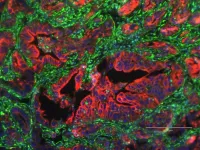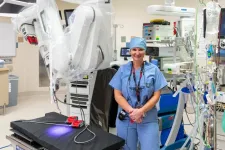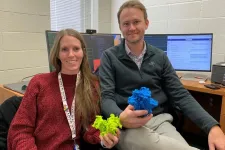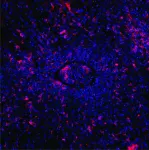(Press-News.org) Pancreatic cancer is the No. 3 cause of cancer-related deaths in the United States, and only 12% of patients survive five years after being diagnosed. Severe pancreatic cancer is associated with metastasis, and it is this spread of secondary tumors that usually causes death, but little is known about the molecular mechanisms that drive metastasis.
In a study published Dec. 18 in Advanced Science, researchers from the University of California, Davis showed that abnormal expression of the protein Engrailed-1 (EN1) promotes pancreatic cancer progression and metastasis in vitro and in mouse models. The team also found that elevated EN1 was associated with severe, metastatic pancreatic cancer in human patients, which suggests that EN1 might make a good target for pancreatic cancer therapies.
“We identified a novel epigenetic factor that can contribute to metastasis in pancreatic cancer, which is one of the most challenging cancers to treat,” said Chang-Il Hwang, an assistant professor in the UC Davis Department of Microbiology and Molecular Genetics and a senior author on the paper. “A better understanding of these mechanisms would allow us to identify potential targets and improve patient survival.”
Uncovering a main actor in pancreatic metastasis
Metastasis is an important component of pancreatic cancer progression, but researchers have not been able to identify genetic mutations responsible for it. For this reason, Hwang thought that nongenetic factors, such as epigenetic changes or altered protein production, might be at play. His team previously identified several transcription factors — proteins that control the production of other proteins — that are elevated in pancreatic cancers that have undergone metastasis compared to primary tumors.
One of these proteins, EN1, is essential for the survival of neurons during development and is not usually produced in adult pancreatic cells. EN1 has been shown to promote aggressive forms of breast cancer, and it is also associated with poor prognosis in other cancers, including glioblastoma and salivary gland adenoid cystic carcinoma, but its role in pancreatic cancer had not previously been described.
The researchers tested whether inhibiting EN1 or ramping up its expression impacted the growth and survival of pancreatic cancer “organoids” — three-dimensional clumps of lab-grown tissue. They found that, without EN1, pancreatic cancer cells were less likely to survive and divide, but adding extra EN1 increased the tumors’ survival. Furthermore, when the researchers genetically modified mouse pancreatic cancer cell lines so that they produced more EN1 than usual, the cells showed increased rates of cell invasion and migration, key features of metastasis.
“It’s very clear that EN1 is a really important factor behind the aggressiveness of pancreatic cancer,” said first author Jihao (Reno) Xu, a doctoral candidate in the Biochemistry, Molecular, Cellular and Development Biology graduate group. “When we take the tumor cells and make them overexpress EN1, they become more metastatic and aggressive, and when we knock it down, they become less metastatic.”
By analyzing publicly available patient databases, the researchers also showed that EN1 is important for prognosis in human pancreatic cancer. They found that EN1 levels were elevated in a subset of patients with advanced pancreatic cancer, and that patients with elevated EN1 tended to have worse prognoses.
“Patients with high levels of EN1 have shorter survival times, which suggests that it is contributing to the aggressiveness of pancreatic cancer,” said Hwang.
Now, Hwang, Xu and their colleagues are working on ways to translate their findings into the clinic by testing different ways to target EN1. They also plan to continue investigating other nongenetic factors that might contribute to pancreatic cancer progression.
“Ultimately, we want to identify new therapeutic strategies to tackle this disease,” Xu said.
Additional authors on the paper are: at UC Davis, EunJung Lee, Keely Y. Ji, Omar W. Younis and Alexander D. Borowsky; Jae-Seok Roe, Yonsei University; Claudia Tonelli, Tim D.D. Somerville, Melissa Yao, Joseph P. Milazzo, Herve Tiriac, Youngkyu Park, Christopher R. Vakoc and David A. Tuveson, Cold Spring Harbor Laboratory; Ania M. Kolarzyk and Esak Lee, Cornell University; Jean L. Grem, Audrey J. Lazenby, James A. Grunkemeyer and Michael A. Hollingsworth, University of Nebraska Medical Center.
The work was supported by the UC Davis Comprehensive Cancer Center Pilot Grant and the National Institutes of Health.
END
Researchers identify protein linked to metastasis in pancreatic cancer
Discovery could advance life-saving therapies
2024-02-03
ELSE PRESS RELEASES FROM THIS DATE:
Common food preservative has unexpected effects on the gut microbiome
2024-02-02
Food manufacturers often add preservatives to food products to keep them fresh. A primary purpose of these preservatives is to kill microbes that could break down and otherwise spoil the food. Common additives like sugar, salt, vinegar and alcohol have been used as preservatives for centuries, but modern-day food labels now reveal more unfamiliar ingredients such as sodium benzoate, calcium propionate, and potassium sorbate.
Bacteria produce chemicals called bacteriocins to kill microbial competitors. These chemicals can serve as natural preservatives by killing potentially dangerous pathogens ...
Single-port robotic surgery is making its debut in the mountain west
2024-02-02
Huntsman Cancer Institute at the University of Utah (the U) proudly introduces the first and only single-port robot in the Mountain West for head and neck surgical oncology patients. This state-of-the-art technology is a groundbreaking step in the field of oncological surgery, allowing for greater precision and less invasive procedures. Under the visionary leadership of dedicated healthcare professionals, the institute is committed to revolutionizing treatments for cancer patients.
“I am delighted that Huntsman Cancer Institute can now offer cancer patients in the Mountain West access to this innovative and life-changing technology,” says Sachin ...
Potential to ‘save more lives than doctors’: Rice launches WaTER Institute to develop accessible clean water technology
2024-02-02
Forty-three million Americans lack access to municipal water, and 1 in 10 people globally do not have access to safe drinking water. Rice University’s new WaTER Institute, launched today, aims to address this and other complex water-related challenges.
“Clean water can save more lives than doctors,” said Pedro J. Alvarez , the institute’s director and the George R. Brown Professor of Civil and Environmental Engineering.
The institute’s researchers will also predict and prevent diseases by monitoring wastewater; ...
New guidelines aim to elevate comprehensive care for people with severe epilepsy
2024-02-02
(February 2, 2024) The National Association of Epilepsy Centers (NAEC) has developed updated guidelines that outline the comprehensive services and resources epilepsy centers should provide to improve quality of care for people whose epilepsy is not well-controlled.
An Executive Summary of the 2023 Guidelines for Specialized Epilepsy Centers: Report of the National Association of Epilepsy Centers Guideline Panel was published online on February 2, 2024, in Neurology®, the medical journal of the American Academy of Neurology. The complete NAEC guidelines are published as an eAppendix on the journal’s website.
Epilepsy is one of the most ...
Welch Foundation supports Johnson-Winters' TB research
2024-02-02
With a $300,000 grant, the Welch Foundation is supporting University of Texas at Arlington research into why some types of Mycobacterium tuberculosis (Mtb), the bacteria that causes the lung disease tuberculosis (TB), do not respond to treatments.
Since its founding in 1954, the Houston-based Welch Foundation has contributed to the advancement of chemistry through research grants, departmental programs, endowed chairs and other special projects in Texas.
“As one of the nation’s largest private funding sources for chemical research, it is our job ...
A sleeker facial recognition technology tested on Michelangelo’s David
2024-02-02
Many people are familiar with facial recognition systems that unlock smartphones and game systems or allow access to our bank accounts online. But the current technology can require boxy projectors and lenses. Now, researchers report in ACS’ Nano Letters a sleeker 3D surface imaging system with flatter, simplified optics. In proof-of-concept demonstrations, the new system recognized the face of Michelangelo’s David just as well as an existing smartphone system.
3D surface imaging is a common tool used in smartphone facial recognition, as well as in computer vision and autonomous driving. These systems typically consist of a dot projector that contains multiple components: ...
Plant groupings in drylands support ecosystem resilience
2024-02-02
Many complex systems, from microbial communities to mussel beds to drylands, display striking self-organized clusters. According to theoretical models, these groupings play an important role in how an ecosystem works and its ability to respond to environmental changes. A new paper in PNAS focused on the spatial patterns found in drylands offers important empirical evidence validating the models.
Drylands make up 40 percent of the Earth’s landmass and are places where water is the limiting resource for life. They often display a characteristic ...
Scientists see an ultra-fast movement on surface of HIV virus
2024-02-02
DURHAM, N.C. – As the HIV virus glides up outside a human cell to dock and possibly inject its deadly cargo of genetic code, there’s a spectacularly brief moment in which a tiny piece of its surface snaps open to begin the process of infection.
Seeing that structure snap open and shut in mere millionths of a second is giving Duke Human Vaccine Institute (DHVI) investigators a new handle on the surface of the virus that could lead to broadly neutralizing antibodies for an AIDS vaccine. Their findings appear Feb. 2 in Science Advances.
Being able to attach an antibody specifically to ...
Gene editing precisely repairs immune cells
2024-02-02
Some hereditary genetic defects cause an exaggerated immune response that can be fatal. Using the CRISPR-Cas9 gene-editing tool, such defects can be corrected, thus normalizing the immune response, as researchers led by Klaus Rajewsky from the Max Delbrück Center now report in “Science Immunology.”
Familial hemophagocytic lymphohistiocytosis (FHL) is a rare disease of the immune system that usually occurs in infants and young children under the age of 18 months. The condition is severe and has a high mortality rate. It is caused by various gene mutations that prevent cytotoxic T cells from functioning normally. These ...
COPD: The effect of low-dose cadmium, a highly toxic metal, on airway epithelial cells
2024-02-02
BIRMINGHAM, Ala. – Cigarette smoke exposure is associated with the development and severity of chronic obstructive pulmonary disease, or COPD, which is the third leading cause of death worldwide.
Cigarette smoke contains 2 to 3 micrograms of cadmium, a highly toxic metal and environmental pollutant, per cigarette. Burning tobacco releases cadmium oxide that can be adsorbed onto microparticles in smoke that travel deep into the lungs. Furthermore, the body is not able to remove cadmium, which accumulates in longtime smokers.
In ...
LAST 30 PRESS RELEASES:
Learning makes brain cells work together, not apart
Engineers improve infrared devices using century-old materials
Physicists mathematically create the first ‘ideal glass’
Microbe exposure may not protect against developing allergic disease
Forest damage in Europe to rise by around 20% by 2100 even if warming is limited to 2°C
Rapid population growth helped koala’s recovery from severe genetic bottleneck
CAR-expressing astrocytes target and clear amyloid-β in mouse model of Alzheimer’s disease
Unique Rubisco subunit boosts carbon assimilation in land plants
Climate change will drive increasing forest disturbances across Europe throughout the next century
Enhanced brain cells clear away dementia-related proteins
This odd little plant could help turbocharge crop yields
Flipped chromosomal segments drive natural selection
Whole-genome study of koalas transforms how we understand genetic risk in endangered species
Worcester Polytechnic Institute identifies new tool for predicting Alzheimer’s disease
HSS studies highlight advantages of osseointegration for people with an amputation
Buck Institute launches Healthspan Horizons to turn long-term health data into Actionable healthspan insights
University of Ottawa Heart Institute, the University of Ottawa and McGill University launch ARCHIMEDES to advance health research in Canada
The world’s largest brain research prize awarded for groundbreaking discoveries on how we sense touch and pain
Magnetofluids help to overcome challenges in left atrial appendage occlusion
Brain-clearing cells offer clues to slowing Alzheimer’s disease progression
mRNA therapy restores fertility in genetically infertile mice
Cloaked stem cells evade immune rejection in mice, pointing to a potential universal donor cell line
Growth in telemedicine has not improved mental health care access in rural areas, study finds
Pitt scientists engineer “living eye drop” to support corneal healing
Outcomes of older adults with advanced cancer who prefer quality of life vs prolonging survival
Lower music volume levels in fitness class and perceived exercise intensity
Of crocodiles, counting and conferences
AERA announces 2026 award winners in education research
Saving two lives with one fruit drop
Photonic chips advance real-time learning in spiking neural systems
[Press-News.org] Researchers identify protein linked to metastasis in pancreatic cancerDiscovery could advance life-saving therapies







